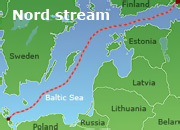The jury selected the company in recognition of its project "Logistics for the Pipeline", i.e. the logistics for the Nord Stream gas pipeline through the Baltic Sea from Wyborg, Russia, to Lubmin near Greifswald, Germany. The award ceremony took place in Berlin within the scope of a gala event held on the evening of the first day of the 27th German Logistics Congress, which takes place from October 20 to 22.
In his speech, Professor Hans-Olaf Henkel, the chairman of the jury, summarised the reasons for awarding Nord Stream with the prestigious prize: "The magnitude of the project is gigantic. Huge amounts of material had to be procured from the world market and transported. By placing production hubs at the beginning and end of the large building site, material flows were minimised. Thanks to the infrastructure expansion in the ports, the use of the means of transport was optimised, and the handling overhead was streamlined as far as possible. Short routes reduced the building site traffic. Emissions were cut. Methods and techniques from other industries were smartly adapted. The error rate in the material supply was zero, and so far, the assembly has not been interrupted. New jobs have been created in regions with a weak economic structure and will most likely continue to be available on a long-term basis, as other large orders will follow after the end of the project. The company showed courage in making unusual decisions and was highly target-oriented. With a great majority, the jury elected the project as exemplary and worthy of the award."
The Winner
Nord Stream AG is the youngest winner on the list of companies recognised for their logistics concept since 1984. Nord Stream was established as Nordeuropäische Gasleitungs-Gesellschaft on December 2, 2005 and was renamed Nord Stream AG in October 2006. The shareholders of Nord Stream are the Russian Gazprom with 51 percent, BASF SE/Wintershall Holding GmbH and E.ON Ruhrgas AG with 15.5 percent each, and the Dutch N.V. Nederlandse Gasunie and the French GDF SUEZ S.A. with 9 percent each. Following its commissioning, Nord Stream will operate the pipeline. The task of Nord Stream AG is to plan, build, and operate the gas pipeline through the Baltic Sea, thereby connecting the world's largest natural gas reserves in Russia with the European gas grid. This pipeline consists of two parallel lines of 1,224 kilometres each. The first line with a transport capacity of approximately 27.5 billion cubic metres (bcm) a year is to go live in 2011. Upon completion of the second line in 2012, the transport capacity is to be doubled to approximately 55 bcm. 55 bcm means about one tenth of the current demand for natural gas in the EU. The investment volume of 7.4 billion euros for the construction of the pipeline includes a logistics budget of 650 million euros.
Project Volume
The two lines require 2 x 100,000 pipe segments of an average length of 12.2 metres and an outer diameter of approximately 1.4 metres. The total weight of the steel of which the pipes consist amounts to 2.2 million tonnes (1.6 million tonnes from Germany, 0.5 million tonnes from Russia, and 0.1 million tonnes from Japan). Along with the inner and outer corrosion protection coating and an additional concrete layer, the total weight amounts to 4.6 million tonnes. Taking into account the heavy concrete layer consisting of cement (0.4 million tonnes from Germany), magnetite (1.45 million tonnes from Sweden), and sand/split (0.4 million tonnes from Norway and Finland) for secure fastening on the seabed, the material to be moved with all transports and handling operations totals 90 million tonnes. The optimised supply chain with 30 participating companies from 10 countries necessitates custom-tailored building logistics.
08 Февраля 2026 | воскресенье | 15:43


